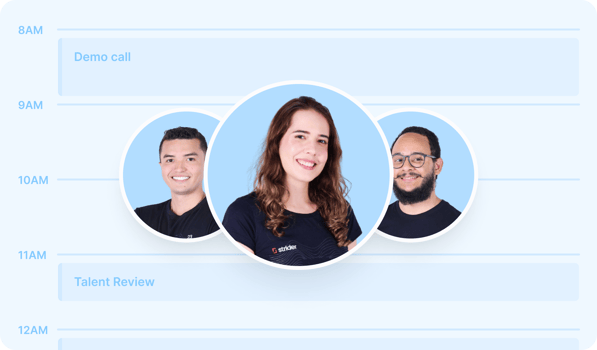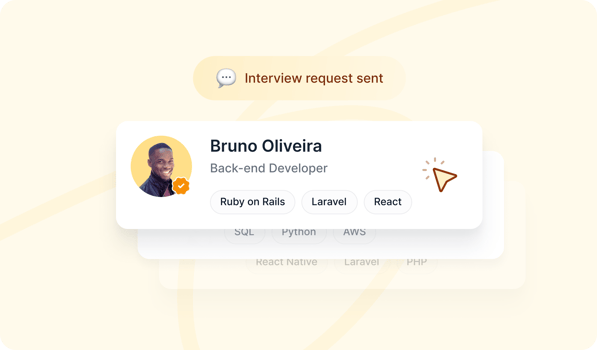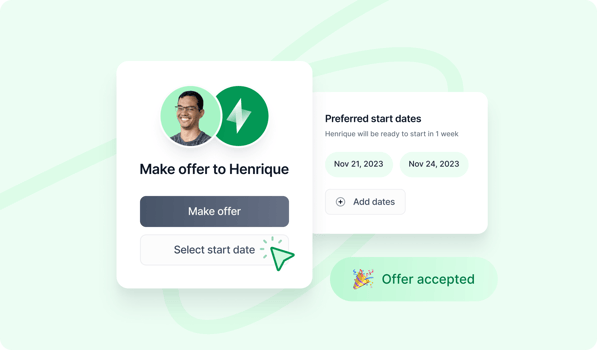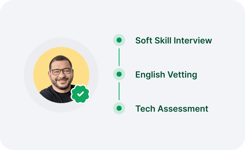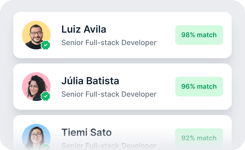Hire Remote Blockchain Developers
A blockchain is a shared, distributed database or ledger between computer network nodes. A distributed, peer-to-peer computer network uses a fixed, digital ledger called a blockchain to track assets, both physical and digital, and record transactions. Each server connected to the network, known as a node, then records copies, and stores those transactions as blocks.
Blockchain development is the process of building, designing, and maintaining blockchain systems and applications. Blockchain development is the process of building a shared, immutable distributed ledger technology (DLT) that safely records transactions and tracks assets inside a network, whether those assets are actual, like money or real estate, or nonphysical, like copyrights.
A blockchain developer, that is, a software developer who specializes in blockchain technology, creates software on top of the blockchain, including decentralized applications (dApps) and smart contracts based on blockchain technology.
Blockchain technology first became well-known with the emergence of cryptocurrencies, but it has broken out of cryptocurrency to become a key force shaping the modern digital scene. It is gradually being embraced by businesses and government agencies all around the world and is quickly demonstrating its advantages.
Finding a blockchain developer can be challenging. To become a valuable blockchain specialist, you need more than just smarts and good grades. You must understand successful hiring processes and practices in order to find and hire experienced blockchain developers.
What to look for when hiring Blockchain Developers
If you want to recruit a top-notch blockchain developer, there are a few things to watch out for during the hiring process so you can hire someone that meets your company’s specific needs.
Technical skills
If you want to hire the top blockchain developers, they need to have the technical abilities listed below. A blockchain developer should be proficient in at least programming languages like Solidity, JavaScript, Python, Go, and C++. They must also have extensive knowledge of data structures, blockchain architecture, cryptography, and security principles.
They must also have a deep understanding of blockchain technology, experience with distributed systems, and familiarity with popular blockchains like Bitcoin and Ethereum.
Communication skills
Finding someone knowledgeable on the technical site is obviously very important, but communication skills and soft skills are also crucial. The developer you work with should be able to communicate openly with you and provide you with regular updates on the project's status. That way, you won't be in the dark.
Also, you must make sure they can follow your creative direction and project deadlines. If you and your blockchain developer can properly communicate and collaborate, working together would be more seamless, which can ensure speedy project development.
It can be difficult to ascertain their communication skills prior to hiring, but you can pay close attention to how they respond during the interview stage. You could also pose some behavioral questions to ascertain how they would communicate and react in certain situations. You should pay attention to the blockchain specialists who have effective listening and speaking communication skills if you want to have a smooth and productive working environment.
Strong understanding of web development
Blockchain developers are typically required to create web apps, also known as web-based applications and although this is only a requirement if your job calls for it, a solid understanding of web development is essential to mastering this.
Search for applications that have a lot of experience with web development initiatives. A specialist with an in-depth understanding of web development can effectively develop web applications with blockchain integration. Look for dedicated blockchain developers to work on your Blockchain projects with web development talents on resumes like
- HTML
- CSS
- JavaScript
- TypeScript
Thus, look for specialists with experience in web design, development, and application coding while looking for Blockchain developers for hire. They are crucial because most blockchain apps are made to be used by non-technical users.
Working knowledge of object-oriented programming
One of the pillars of blockchain development is object-oriented programming. Finding OOP experts for blockchain profiles is crucial for businesses if they want to be able to work on challenging issues and write reusable code. Search for programmers that have a history of using polymorphism and modularity for troubleshooting.
Competency in cryptography
One of the most crucial abilities for a blockchain developer is cryptography. It is employed to create protocols that shield data from illegal access. It is imperative to take apps with a thorough understanding of cryptography into consideration when looking to recruit a blockchain developer. Here are some keywords that you might want to look for, though make sure to research more about each keyword so that you understand it and can ask relevant questions about it:
- Cryptography
- Decryption
- Critical
- Cipher
- Symmetric-Key
- Asymmetric-Key
- Hash Functions
Knowledge of security
As security is a key component of blockchain development, it's crucial to work with blockchain specialists that are well-versed in security best practices and have expertise in putting security measures in place.
This is very important, as blockchain is meant to be a secure way to transfer and store data, and one of its primary benefits is offering security during transactions. This makes security essential, and developers with a deep understanding of the best security standards should be given priority because access to a user's credentials and other sensitive information can cause losses for both the user and the blockchain network.
Top 5 Blockchain Developer Interview Questions
What does "scriptPubKey" mean? Explain the spending of a P2SH address.
By asking this question, you would ascertain not just the knowledge level of the developer but also their experience level. A scriptPubKey is known as a “locking script.” It can be found in transaction output and is an obligation that must be satisfied before the output can be spent.
P2SH is a unique address type where the intricate locking script is swapped out for its hash. A later transaction seeking to spend the output must include both the unlocking script and the script that matches the hash.
What is a trapdoor function, and what is its use in blockchain development?
Although this question may seem basic, asking this question is important. A blockchain developer should know not just the “advanced” things about blockchain development but also its fundamentals in order to be considered an excellent developer. A function known as a "trapdoor function" is one that is simple to compute in one direction but complex to compute in the opposite direction without particular knowledge.
Trapdoor functions are frequently used in blockchain development to symbolize the concepts of addresses and private keys because they are necessary for public key encryption.
In a peer-to-peer (P2P) network, how does peer discovery operate?
Asking this question is crucial, even though it might seem simple. To be regarded as a top developer, a blockchain developer must be knowledgeable about both the fundamentals and the "advanced" aspects of blockchain development.
There is no central server, so when a new node boots up, it has no knowledge of the network. Typically, developers include a list of trusted nodes that can be utilized for initial peer discovery directly in the code.
How do verifiers determine the validity of a block?
This is an intermediate-level question that can be asked of developers of all levels in order to determine how knowledgeable and skilled they are in blockchain development.
The network's entire nodes do block verification. Every node that receives a new block performs a series of checks. The two most crucial checks are the ones that determine if a block offers enough work to be added to the chain and whether all transactions are genuine (each transaction must be valid).
What happens if a smart contract's execution costs more than the allotted gas?
A smart contract execution can cost more than the allotted gas, and a blockchain developer must know what would happen if this happened in order to be able to solve it. It is a typical scenario, and asking this question is important.
Your transaction will initially be carried out, but if the cost of carrying out a smart contract exceeds the allotted gas, the miners will stop verifying your contract. The transaction will be marked as unsuccessful on the blockchain, and the user won't receive a refund.


